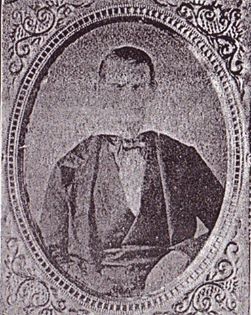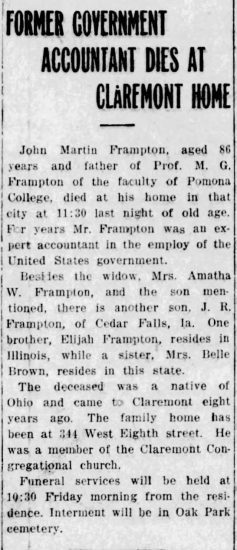Elijah Frampton, Senior
Source: Early Days in Greenbush with Biographical Sketches of the Old Settlers by William L. Snapp

Lucinda (Trowbridge) Frampton was born near Marietta, Ohio 8 April 1811; married Elijah Frampton at Burlington, Ohio, on 28 May 1828; died at Avon, Illinois, on 15 March 1895.
Elijah Frampton was born near Lewistown, PA., on 20 April 1786. He was married on 20 Oct. 1822 to Rebecca Clark and again to Lucinda Trowbridge on 28 May 1828, both at Burlington, Ohio. He died at Avon, Illinois 23 Jan. 1877.
To the first union were born five children – four of whom died in fancy [sic] – viz: Isaac Clark, William Walker, and three sisters (triplets). Isaac C. and their sisters died in infancy.
To the second union were born four children, namely: Elijah, John Martin, Rachel Jane, and Isabelle Rogers. Rachel died on 26 Oct. 1836 at the age of four years.
Mr. Frampton, like most boys of his time, was sent to school only three months each year. School books were scarce, one set usually did duty for the whole family. He made a specialty of mathematics, with a view to taking up surveying. Shortly after he had mastered the business, his father died; and he, being the oldest boy, was suddenly brought face to face with the problem of bread and butter for the family, which was a large one.
He soon discovered that while surveying gave him a prominent place in the community, there was not enough in it to enable him to support a large family. And so, he gave it up and turned his attention to boating on the Ohio River. At that time river transportation was almost wholly done by flatboats and keelboats.
These boats would be loaded at Pittsburg and floated down the river as far as necessary, and then pulled, “cordelled,” by means of a rope, and pushed with long pike poles, back to the starting place.
This sort of life was full enough of incident and adventure to make it quite spicy and was besides a cash-down business. Settlements on the river were few and far between. To add to its beckoning our thoughts away from the realities of this hard, inexorable life, so full of bickering and heart-breaks, to that life of perennial beauty and happiness, which we count upon in our reckoning of the great hereafter.
Notwithstanding the fact that he was physically a powerful man, inured to the hardships of frontier life, the exacting life of an itinerant preacher was too much for him; and although much against his will, he was forced to resign.
He then bought a farm and moved on to it. While here he was chosen and served a term as Judge of the court for Lawrence County, Ohio; but office-holding did not suit him, and he went back to his farm.
In 1842, he became restless of a farmer’s life and again betook himself to boating. He purchased a large flatboat, loaded it with tan bark, took it to Cincinnati, and sold it all. He then returned, sold his farm, and bought a very large keel-boat, when he loaded with provisions, took his family on board, and floated off down Ohio, into the Mississippi river, down through bayou Atchafalaya, in Grand Lake, in Louisiana.
The next year he made another trip to the south, selling out his boat and provisions. He then went to New Orleans, bought a stock of dry goods, and took passage on a steamer for Quincy, Illinois, where he arrived sometime in April 1845.
In May 1845, he sold his stock of food and moved to Greenbush, Illinois, where he lived until the fall of 1863, when he moved to Avon, Illinois, where he died, as before stated, on 23 Jan. 1877.
John Frampton, the father of the subject of this sketch, was a soldier in the War of Revolution, belonging to the Cumberland county Rangers, and was with Washington, when his army crossed the Delaware River on the floating ice, 25. Dec. 1776.
Lucinda (Trowbridge) Frampton was born near Marietta, Ohio 8 April 1811; married Elijah Frampton at Burlington, Ohio, on 28 May 1828; died at Avon, Illinois, on 15 March 1895.
In her youth, she was possessed of more than ordinary beauty. She was of very cheerful disposition, always looking on the bright side of life. To the day of her death, she had the faculty of attracting to herself the society of young people, which she greatly enjoyed. She was everybody’s friend – bore no malice.
William Walker Frampton, born in Burlington, Ohio, 5 Dec. 1824; married Mary Anderson, in 1949; and again, Mary Miller, in 1852 – both at Quincy, Illinois; again married (name not given), in 1867; and again, Ella Eckman – both of the latter at DeSoto, Kansas.
William was a stationary engineer and surveyor by profession. He learned the trade of engineering on a steamboat, on the Mississippi and Missouri rivers. In 1852, he came from near Blandinsville, Illinois, to Greenbush, Illinois, to take charge of a sawmill and corn cracker owned by Ragon and Mather.
In 1856, he and his brother Elijah bought the mill and put in two sets of burs for grinding wheat. On 1 Sept. 1858, the mill burned down. At this time, it belonged to Dr. Baily Ragon, the Framptons having sold out to him in the spring of the year. William going to Blandinsville, Illinois, and Elijah is to Kansas.
William moved to DeSoto, Kansas, in 1859, where he now resides. He served as a private in the Seventh Kansas Infantry, in the War of the Rebellion, being mustered out in 1865. By his second wife, William had three children: Charles, Amenia, and an infant, which died in infancy, at Blandinsville, Illinois.
Elijah Frampton, Jr., born in Burlington, Ohio, on 20 May 1829; married Sarah Walker Hannon, at Greenbush, Ill., on 1 Nov. 1855. To them were born three children: Ida Cornelia, 7 Nov. 1856; Edward Trowbridge, 12 March 1860; and Netty Hanon, 17 March 1862. Ida C. died in Kansas on 16 May 1860; and Netty H. in Greenbush, on 27 July 1864. On 27 July 1864, his wife also died at Greenbush, where she was buried.
Elijah learned the trade of miller at Canton, Mo. He then secured a place in one of the Quincy mills. In 1852, he came to Greenbush and took charge of the corn crackers. In 1856, he and William bought the mill and put in a flour mill, which they ran until the spring of 1858, when he sold out and moved to Kansas, along with Elijah Hanon, his wife’s father, and Samuel M. Snapp, his brother-in-law.
In the spring of 1860, they returned to Greenbush, having been driven out of Kansas by the terrible drouth [sic] and the grasshopper scourge. In 1864, after the death of his wife, he went to Avon, Ill., where he now resides. His son Edward married a lady in Kansas, where he still resides.
Elijah learned the trade of wagon-maker under Porter J. Jack, at Greenbush, in 1864, and he continued to work at his trade in Avon and Bushnell. At the latter place, he was associated with Henzie Darneille in the wagon-making business.
Isabelle Rogers Frampton was born 26 Aug. 1846; married John B. Compton in 1867; came to Greenbush, in 1854, and to Avon, in 1863, where she was married. From Avon, they went to Bement, Illinois, where Compton secured a place with the Wabash railroad. He was killed by the cars in 1892. Mrs. Compton is now living in Chicago with her five children.
John Martin Frampton was born in Burlington, Ohio, on 22 Oct. 1830; married at Pittsfield, Illinois, to Miss Amatha Whittaker, 25 Dec. 1872; moved to Quincy, Illinois, from Ohio, 6 May 1845; moved to Greenbush, Illinois, in December 1856; moved to Avon, Ill., in the fall of 1863; worked on a farm owned by Isaac N. Morris, during the spring and summer of 1848, for eight dollars a month; worked on a steamboat as a pantryman and second steward during the year 1849; taught school in the summer of 1851, at Muddy Lane, in McDonough county, at eighteen dollars a month and boarded himself; clerked in a store at Louisiana, Mo., in the fall of 1851 (pay nominal); worked in the Whig newspaper office at Quincy, Illinois, 1852 to 1855 – pay, sixteen dollars a month; and was a shipping clerk for a large foundry in St. Louis, Mo., from July 1855 to October 1856 – pay, forty dollars a month.
In December 1856, went to work for Ragon and Frampton as bookkeeper and superintendent of the grist department of the mill, at twenty-five dollars a month, at Greenbush, Illinois. 1 Sept. 1858, the mill was burned. He returned to Quincy, Illinois, in the spring of 1859, and kept the books in the Star Mills until November 1860, when the mills were shut down – salary, twenty-five dollars per month.
May 1861, returned to Greenbush; took a place as clerk and bookkeeper with F. H. Merrill & Co., at twelve dollars a month and board; went to Avon with Mr. Merrill, in the fall of 1863, and continued to clerk for him until the spring of 1865 when he had to give up the place on account of a long spell of sickness.

15 April 1867, he was appointed clerk in the U.S. Internal Revenue Service by Gen. L. F. Ross, collector of the ninth district, Illinois. From that date until 1 July 1886, he was continuously in government service as clerk and deputy collector, at a salary from nine to eighteen hundred dollars, serving under five different collectors.
15 April 1867, he was appointed clerk in the U.S. Internal Revenue Service by Gen. L. F. Ross, collector of the ninth district, Illinois. From that date until 1 July 1886, he was continuously in government service as clerk and deputy collector, at a salary from nine to eighteen hundred dollars, serving under five different collectors.
John M. Frampton moved to Pittsfield, Illinois, in July 1892, where he now resides. To Mr. John M. Frampton and his wife were born two sons: Mendel Garbatt, born 21 Nov. 1874; married to Miss Marian D Kirby, at Jacksonville, Ill., 10 Sept. 1903; John Ross, born 10 July 1879. Mendal graduated from Illinois College, Jacksonville, in 1898, with the degree of A.B.; and as a post-graduate, in 1899, with the degree of A.M.; and as a post-graduate at Harvard University, with the degree of A.M., in 1900. He is now a teacher of English at Pomona College, Claremont, California.
John Ross graduated from Oberlin, Ohio, in 1901, as A.B.; and graduated from Oberlin Conservatory of Music, in 1904. He is now a teacher at Iowa College-Conservatory of Music, at Grinnell, Iowa.

0 Comments